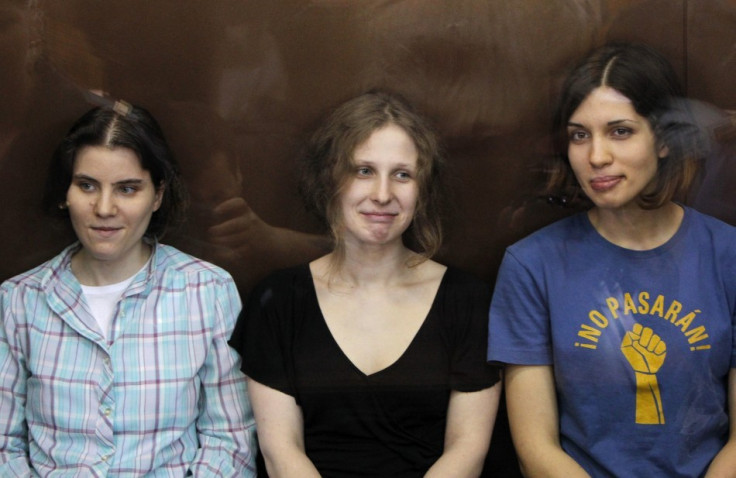Pussy Riot - A Punk Prayer [FILM REVIEW]
Documentary chronicles trial of three feminist activists sentenced to prison for punk prayer in Moscow's Christ the Saviour cathedral

The most touching scene of HBO's documentary on the Pussy Riot punk group occurs when the breezy father of Nadia talks about his daughter performing an orgy to parody then-president Dmitry Medvedev's plans to boost the birth rate.
Nadia - who later became a magnetic feminist activist with a trademark sly grin - had just made her first steps in the incendiary Voina art group along with her husband, the street artist Pyotr Verzilov. In a scene of bittersweet irony, her open-minded father tells the camera that he would have enjoyed the avant-garde stage show - if only it not been performed by his daughter.
His blend of political naivete, extreme idealism and Russian sarcasm mirrors that of Ekaterina Samutsevich, Maria Alehina and Nadezhda Tolokonnikova (Nadia), who were charged with hooliganism driven by religious hatred after performing a 40-second "punk prayer" in Moscow's Cathedral of Christ the Saviour in February 2012 and sentenced to two years in penal camps. Samutsevich was later freed with a suspended jail sentence following an appeal.
Undoubtedly, the three struck an open wound in Russia's complex post-Soviet society, despite the amateurism of their performance and the lyrics, "Holy mother, chase Putin out". As Mike Lerner's and Maxim Pzdorovkin's rigourously well-crafted documentary shows, the cathedral holds a special significance for the Russian faithful as a symbol of the rebirth of open religious worship in Russia.
The cathedral was dynamited and reduced to rubble in 1931 by order of Stalin's minister Kaganovich. During the days of the Soviet Union, the site of the cathedral served as the world's largest open-air swimming pool while churchgoers were forced underground to worship.
Christ the Saviour was not rebuilt until the 1990s and the devout could worship freely once more. To many observers, that could explain why dissident journalist Anastasia Kirilenko said it was difficult for the anti-Putin opposition to protect Pussy Riot. Many Russians are devoted Christians and were shocked at the girls' acts. Indeed, in a rather hilarious scene, a woolly-bearded member of a group of Orthodox fanatics - who would look more at home at a gathering of heavy metal-playing Harley Davidson bikers - explains how the translation of Pussy Riot puzzled him.
The man, who wears a T-shirt that says "Orthodoxy or death", has his own take on the women's group name. "Deranged vagina," he explains. "But pussy could also mean kitten and uterus".
That, of course, is not Pussy Riot's main offence.
However strong the temptation might be to reduce the band's actions to a simple act of blasphemy, we must dig to understand their real depth of feeling. Halfway through the film - which, at its core, narrates how the trio become more intellectually aware as the trial progresses - the most aloof of the three, Samutsevich, says she does not fit the bigoted, newly conservative Russian society.
Samutsevich, 30, explains that she does not want to get married and have children. In Putin's conformist society, such a statement is an outright act of rebellion.
Pussy Riot is a weapon directed at Putin's alliance with the Orthodox Church, a conventional marriage dictated by power and greed. Framing a society in the most illiberal, backward principles and disguising those principles as the "traditional" values of the Russian people - that is what Pussy Riot in their naïve, awful performance were really targeting. And that is what this gripping documentary shows.
Pussy Riot - A Punk Prayer is on UK cinemas from 5 July
© Copyright IBTimes 2025. All rights reserved.





















